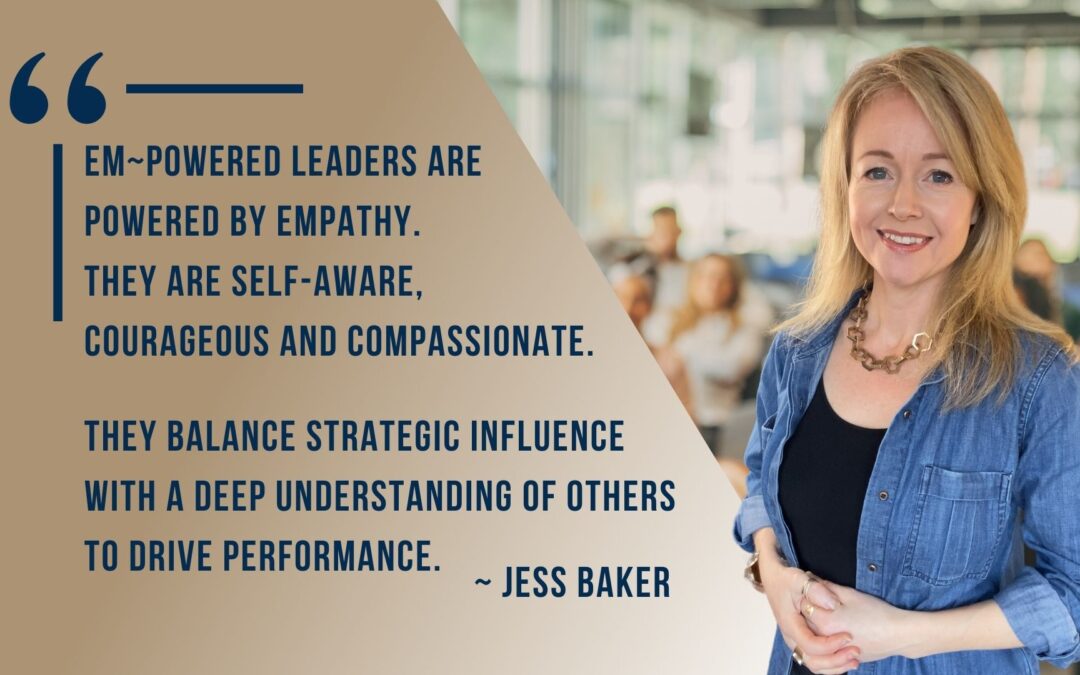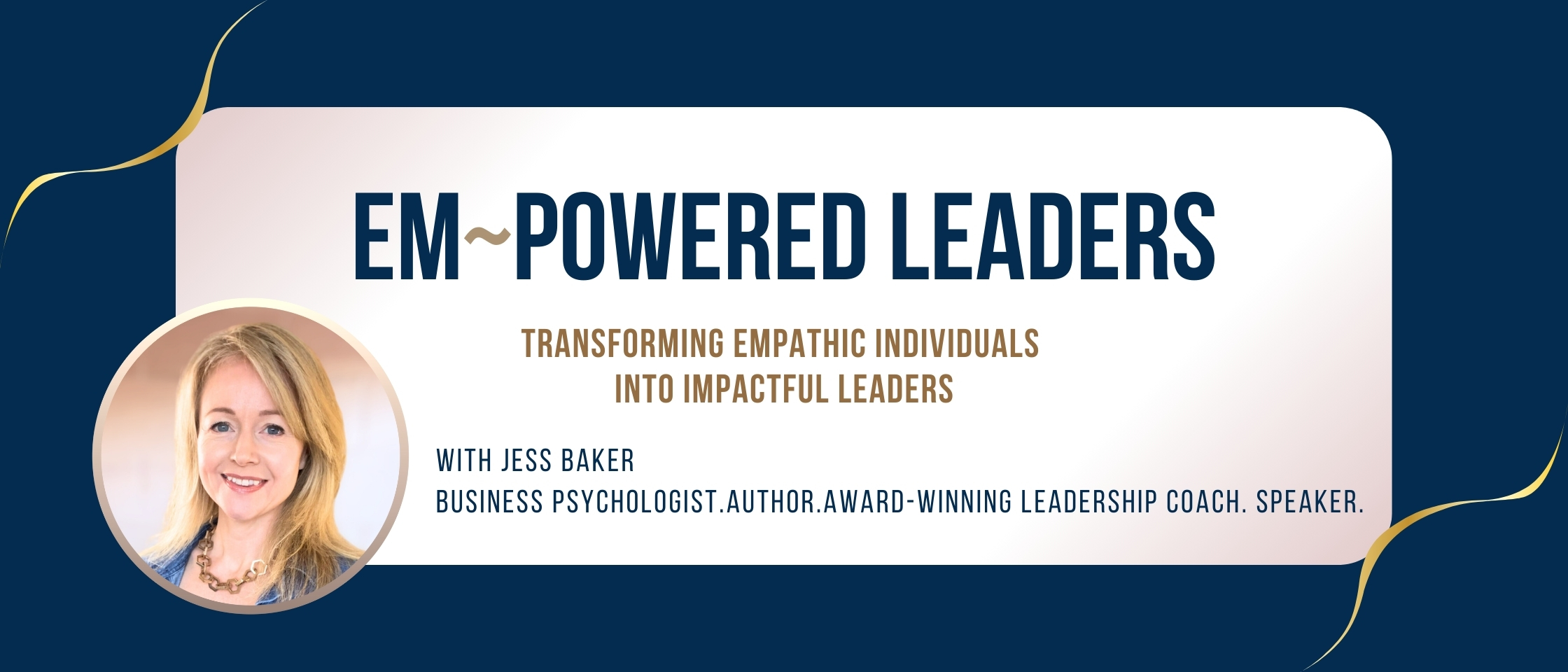Your Leadership Development Is Wasting Time & Money
Here’s what to do instead… introducing my “Empathy-Powered Leadership” approach
The hard truth: Your leadership development is wasting time and money. In fact, most leadership development programmes under-deliver. They always have.
Why?
Because they’re teaching the wrong skills to the wrong people.
Typical programmes focus on skills such as motivating and inspiring people, developing your team, giving feedback, and handling difficult conversations with sensitivity.
We’d all agree that these are essential. However, these skills depend on underlying personal qualities, particularly the ability to tune into others (empathy), the desire to help others (compassion), and understanding your own impact (self-awareness).
Some people in your organisation have these qualities inherently, and some do not. Those who do, have the potential to be natural empathic leaders. For them, traditional leadership training is largely redundant.
On the other hand, many delegates on leadership programmes don’t have these personal qualities (empathy, compassion, self-awareness). They are task-focused, target-driven, and competitive. For these individuals, no amount of leadership skills development will truly work. No matter how much they try to develop, they will always be more interested in their own career development than nurturing talent in others.
After all, you can’t train someone to care.
The Key to Unlocking Hidden Leadership Potential
In most organisations, there’s a hidden pool of talent. It consists of the cohort of people who already have empathy, compassion, and self-awareness. These empathy-powered people seldom reach leadership or the senior positions where they could contribute most.
This is because their career progression is held back in two ways.
1) Empathic people hold themselves back by…
- Downplaying their own accomplishments, experiencing self-doubt and imposter syndrome
- Having a low-profile: avoiding self-promotion because it feels inauthentic
- Being too busy helping colleagues or taking on other people’s work
- Discounting positive performance reviews, and ruminating on the one piece of negative feedback
- Having an unhealthy inner critic that undermines their self-belief
- Struggling to handle their own domineering managers
The reason they hold themselves back like this is because a strong focus on the value of other people can easily become distorted into under-valuing yourself. (The psychological processes underpinning this are explained in more depth in, The Super-Helper Syndrome: A Survival Guide for Compassionate People).
It’s ironic that the very same qualities that make them good at leading people also hold them back from greater opportunity to do so.
2) Organisations hold back empathic people…
Historically, people have been promoted to senior levels because of their specialist knowledge and expertise, with less regard for whether they have the personal qualities for leading people effectively. Sometimes, senior people who have progressed via this route hold back naturally empathic individuals by…
- Mistaking people-focus, niceness and compassion as weaknesses
- Dismissing styles of leadership that are different from their own
- Blocking the progression of strong performers in order to keep them in their own department
You may already be thinking of people who are being held back like this. And it’s a shame, because these people are also typically conscientious, committed, and results-oriented, as well as having the skills for getting the best out of others.
By tapping into this hidden pool of talent you would be cultivating well-rounded leaders who could benefit the whole organisation.
The Business Case for Developing Empathy-Powered Leaders
In the past, many organisations were hierarchical and authoritarian with a competitive management culture.
Some still are.
More recently, we’ve seen a shift towards trying to attain a balanced leadership culture: seeking leaders who are people-oriented as well as task-oriented.
This has led to initiatives such as employee engagement programmes, soft skills training, wellbeing initiatives, and compassionate leadership training, among others.
But, when managers lack the personal qualities of empathy, compassion and self-awareness, it limits the effectiveness of these people-oriented initiatives. And it is becoming increasingly challenging, with a generation of employees who want to feel cared for and valued.
Developing Empathy-Powered leaders is the solution.
Focusing on naturally empathic people is the only way to develop a strong and balanced leadership culture.
Developing these empathic people into leaders reinvigorates your other people-oriented initiatives too. By only focusing on this cohort, it allows you to target development in the most cost- and time-efficient way. Ultimately, it will future-proof your organisation.
Developing empathic leaders can boost employee engagement and workforce wellbeing.
The research shows huge potential for organisational improvements, from burnout to brand reputation…
- Meet the variety of workforce demands from Boomers II to Gen Z
- Lower attrition rates
- Reduce burnout at managerial level by 11%
- Workforce is 25% more engaged and 20% more committed to the organisation
- Enhance the success of DEI initiatives
- Stronger ethos of customer care
- Reduced sickness and absenteeism
- Enhance the organisational brand
For more details and the data sources, please see the list of business benefits here.
The Secret to More Effective Leadership Development
Targeting the Right People with the Right Skills
Those who do have the personal qualities to become empathic leaders do need development, just not in the skills typically covered by leadership programmes.
Essential development themes for empathic leaders include…
🔹 Ditching people-pleasing – leading with gravitas and authority
🔹 Applying the 3As of Assertiveness and setting Strong Boundaries
🔹 Maximising your impact by Dialling Up and Dialling Down specific personal qualities
🔹 Taming and befriending the inner critic
🔹 Overcoming imposter syndrome and owning your accomplishments
🔹 Cultivating self-compassion, instead of just compassion for others
🔹 Role-modelling the 7 Principles of Self-Promotion
🔹 Handling feedback without over-sensitivity or rumination
This is not about changing the empathic individual, it’s about harnessing their natural strengths to become an effective, high-impact leader.
And this is exactly what I’ve been helping my clients to achieve for over a decade – so I know it works.
These themes come up time and again in both my individual coaching and group programmes. It’s a flexible approach, adapted to meet your requirements.


